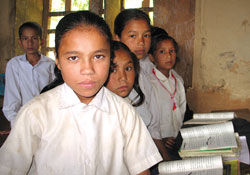|
|
Over 400,000 Nepali children are not in school, the majority of them girls. Among those who do attend, there is a 15 percent middle-of-the-school-term dropout rate. Government scholarships don't reach students who depend upon them in time, textbooks are scarce, as are teachers, and infrastructure is poor to nonexistent in some places.
But you wouldn't know any of this looking at the grandiose plans periodically announced by the Ministry of Education, and now by the Maoists, whose Hisila Yami is tipped to be the next Minister for Education.
At last year's budget announcement, the ministry strongly suggested a move to expanding 'primary' education to include lower secondary grades as well. By law, primary education in Nepal is free. The Maoists, says Yami, want near-free, nationalised, revolutionary education at all levels (see interview), and other student unions have also been making noises about taking the private sector out of education.
There is no discussion about who will pay for all this and how. Extending primary education to grade eight will cost an additional Rs 3.8 billion for teachers' salaries, funds for infrastructure, textbooks, and scholarships, calculates Shailendra Sigdel of DANIDA's Technical Review of School Education (TRSE). That's over four percent of the country's total internal revenue.
Another study by the National Planning Commission and UNDP on Millennium Development Goals shows a deficit of more than Rs 2.5 billion in the basic primary education budget. The gap is expected to widen in the coming years because of low GDP growth. Even with a modest GDP growth rate and continued foreign assistance, there will be a huge funding gap.
Officials at the Ministry of Education, faced with uncertainty over which party will run their office in the interim government, are now backtracking and saying that the proposal is still in the planning stages and will not come into force until 2009.
The real problem-nationalising education-is far more pressing and serious. Lekhnath Neupane, president of All Nepal National Free Students Union (ANNFSU-Revolutionary), argues that if education is a fundamental right, as declared by Nepal's new democratic government back in 1990, then providing it is the responsibility of the government alone. The Maoists maintain that school education should be nationalised to make education accessible to all Nepalis.
Other political parties and unions affiliated with them are pushing a similar, if slightly softer, line. "The contribution of private schools cannot be ignored, but their existence is also the reason for disparity," says Pradeep Poudel of the Nepali Congress-affiliated Nepal Student Union. Unlike Neupane, Poudel has some solutions. "Take money away from defence, cut the army down, and invest that money in education, charge minimum tax on products made in Nepal and put the revenue away for education," he says.
Education sector experts and economists warn that hastily nationalising education up to any level will do far more harm than good. "The quality will deteriorate, and the donors will not support it. It's also tricky because the government simply can't pay private schools any compensation," says economist Shankar Sharma. Sigdel cautions that "the government does not have a good history of implementing policy," and asks "Why is it making new commitments when it hasn't even delivered what it promised earlier?"
Sharma recommends strengthening government schools instead, as creating conditions for more poor people to receive higher education through scholarships, and start vocational training and skills-oriented programs.
"We will link education with labour"
Interview with Hisila Yami, MP and politburo member, CPN-M
|
|
Hisila Yami: Fundamentally what went wrong is that we started thinking about education as an industry. People started investing in education-they would sell off their land and homes, so their kids could go to private schools. So much money was invested, but in the end young people just left the country seeking a better life abroad.
What should the new education policy look like?
First the state should regard education as fundamental right. During the 'People's War' our efforts in education were appreciated because our emphasis was on monitoring. Government schools need to be consolidated, facilities provided, and the performance of teachers monitored. Our education policy will be inclusive and will merge the natural and social sciences. The emphasis will be more on polytechnic education because people who get such training can be employed quickly. Kathmandu-centric education may not work for the rest of Nepal. Similarly we will link education with labour, because it is our biggest asset. The future generation will understand Nepali culture not as a feudal Hindu dominated Bahun-Chhetri culture, but as inclusive of all ethnicities, castes, and languages.
What is your stand on nationalising private schools?
When our war was on, we did not let private schools operate in our areas. Our emphasis was on improving government schools, but we also invested and made model schools. We had our own syllabus, we intervened in some private schools, and monitored to see if there was mismanagement. Our stance is, if we provide enough facilities and qualified people, there will eventually be a move away from private schools. There are ways to nationalise private schools without using coercion-by taxing them etc. I do not look after education, but I think universities may be the first target to be nationalised. In areas the government has not been able to reach, private schools will be allowed to operate.
What is your 'revolutionary education' (janabadi sikchhya) all about?
Janabadi sikchhya is a type of education answerable to the people. More than 80 percent of our country's population is in the villages, which means this type of education has to be rural-oriented. Our economy is dependent on agriculture, therefore there must be a strong focus on agricultural economy. The emphasis will be on creating manpower that is productive and science-based, and it will define nationality in a new way. We can't change the structure right away, we will change the base first and eventually revamp the entire system.




